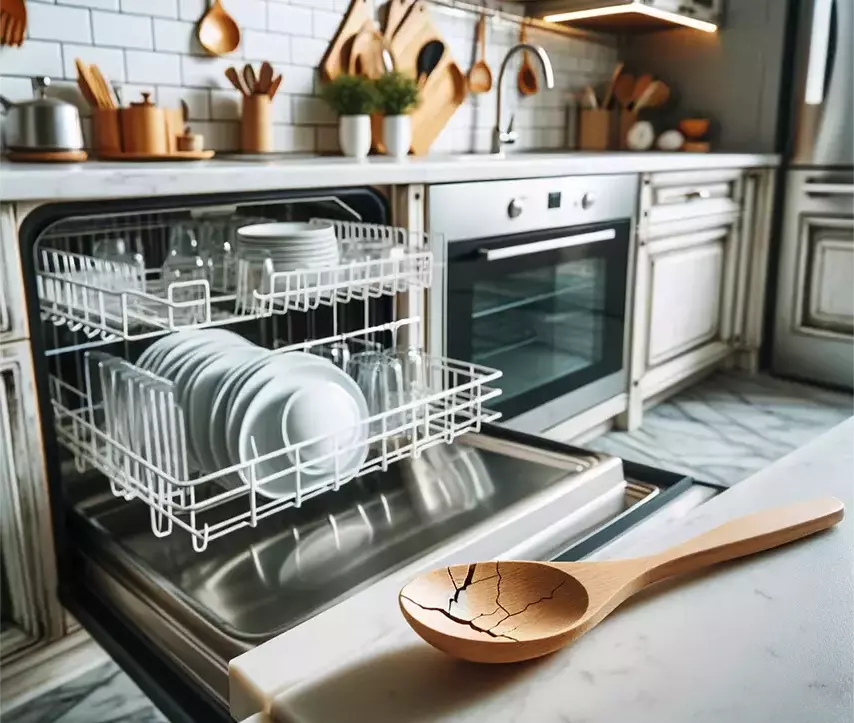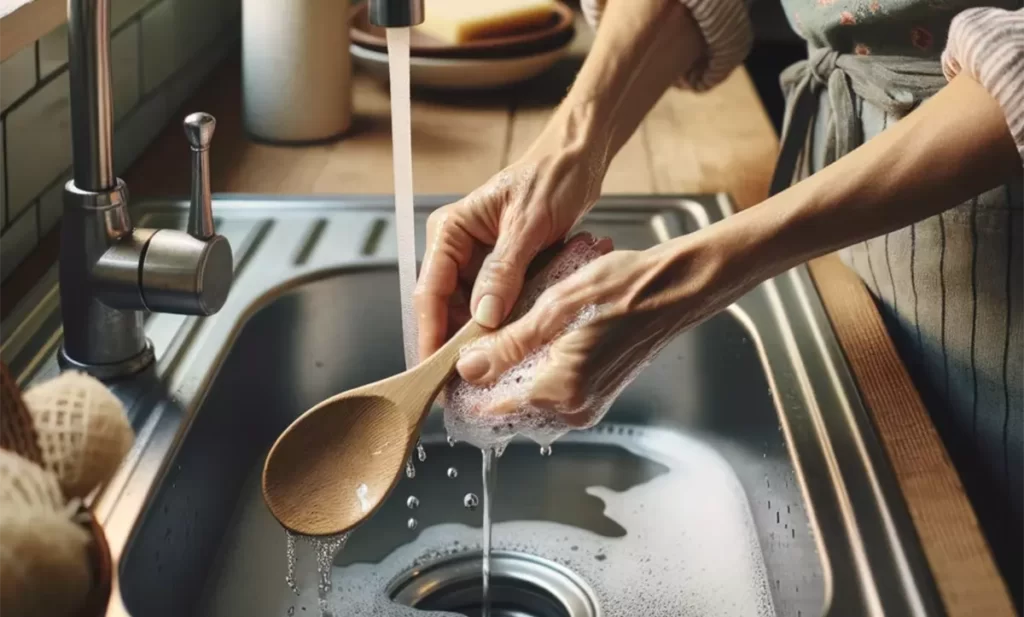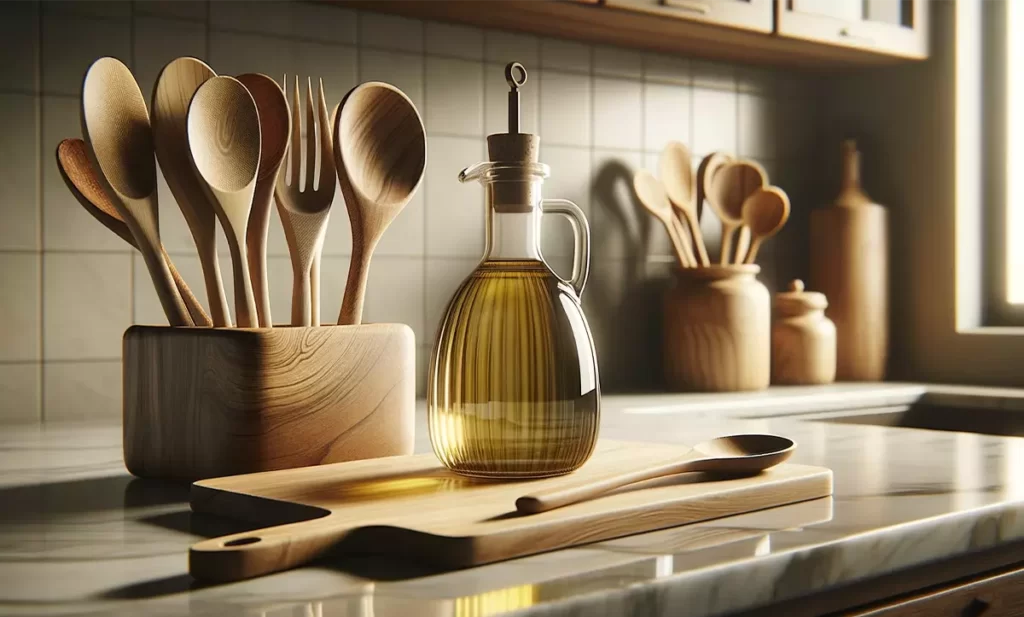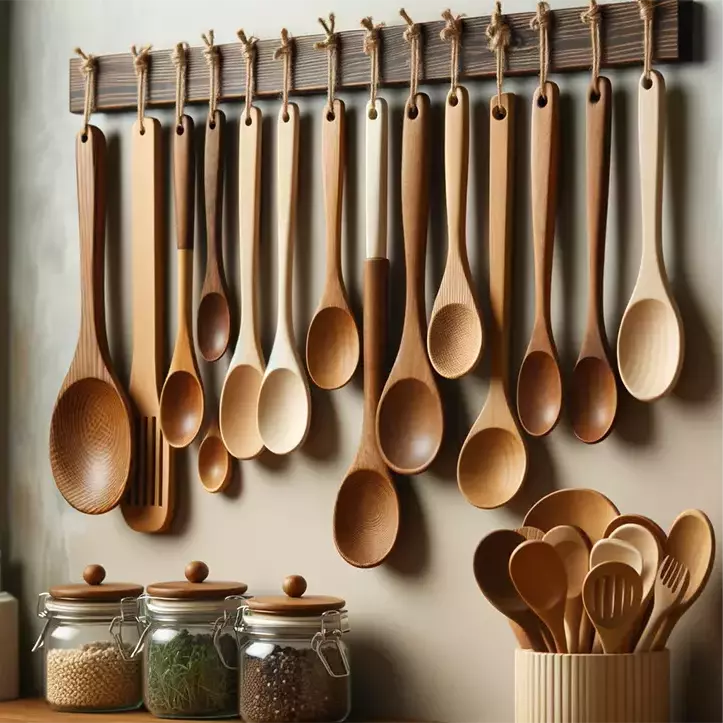No, you should not put wooden spoons in the dishwasher. Handwashing is recommended to clean wooden spoons and extend their life properly.
This article explains why it’s problematic to put wooden spoons in the dishwasher, including risks like high temperatures, damaging moisture, and abrasion that can degrade the wood. It provides tips for handwashing and drying wooden spoons to prevent warping and splitting. The proper care and maintenance of wooden spoons is covered, such as treating them with mineral oil and avoiding excess soaking. Recommendations are given for using wooden spoons during cooking to prevent cracking. Finally, following the provided guidelines will help preserve and prolong the life of your favorite wooden spoons.
Can You Put Wooden Spoons in the Dishwasher?
The short answer is no, you should not put wooden spoons in the dishwasher.

The high heat and harsh detergents used in dishwashers can damage and crack wooden spoons over time. The moisture can cause wooden spoons to warp or split as well.
While some durable hardwoods like maple may withstand an occasional trip through the dishwasher, prolonged exposure will still deteriorate the wood. It’s best to avoid putting wooden spoons or utensils in the dishwasher to extend their usable life. Handwashing is recommended.
Why You Shouldn’t Put Wooden Spoons in the Dishwasher?
There are a few key reasons why putting wooden spoons in the dishwasher is problematic:
- High heat – Dishwasher high heat can reach 150°F or more. This extreme temperature can cause the wood fibers to dry out and the wood to crack or split over time.
- Harsh detergents – Dishwasher detergents are formulated to cut through tough grease and food residue. However, these caustic chemicals are also harsh on natural materials like wood. The detergent can deteriorate the finish and integrity of the wood.
- Moisture – The humidity inside a hot dishwasher can permeate the wood fibers, causing wooden spoons to warp, bend, or become misshapen over repeat cycles.
- Risk of chipping – The forceful spray jets and jostling during the wash cycle can cause nicks and dings in the edges of wooden spoons and utensils.
- Discoloration – Dishwasher chemicals may interact with wood sealers or finishes and cause discoloration or staining over time.
To preserve their condition and extend their functional life, handwashing wooden spoons is best. Let them air dry thoroughly before putting them away.
Can I Put Wooden Spoons in the Dishwasher If I Oil Them First?
No, oiling wooden spoons before putting them in the dishwasher will not prevent them from warping or cracking. While it may offer temporary protection, the repeated cycles will eventually wash away the oil and expose the wood to damage. It does not make them dishwasher-safe for regular cleaning.
An occasional trip through the dishwasher probably won’t ruin an oiled wooden spoon. However, repeated dishwashing cycles will degrade the quality of the wood despite protective treatments. Going forward, it’s better to handwash oiled or untreated wooden spoons. Take care not to soak them in water for prolonged periods either.
How to Safely Clean Wooden Spoons?

To properly clean wooden spoons and keep them in good condition, follow these guidelines:
- Handwash with mild detergent and warm water. Avoid soaking.
- Don’t submerge in water for long periods.
- Use a soft cloth or sponge. No abrasive scouring pads.
- Rinse thoroughly and dry immediately with a clean towel.
- Allow to air dry completely before storing to prevent moisture damage.
- Avoid harsh chemicals like bleach or alkaline dishwasher detergents.
- Wash by hand promptly after use to avoid stains.
- Occasionally, you can disinfect them with a vinegar solution to keep them hygienic without causing damage.
With routine, gentle cleaning and proper care, your favorite wooden spoons can last for many years of cooking use.
How to Wash Wooden Spoons by Hand?
Follow these simple steps to handwash wooden spoons safely and effectively:
- Use warm water and a small amount of mild liquid dish soap.
- For stubborn dried-on foods or stains, let the spoon soak briefly in warm, soapy water before washing. Avoid prolonged soaking.
- With a soft cloth or sponge, gently scrub the soiled areas of the spoon while cleaning around the edges.
- Do not use abrasive scouring pads or cleansers that could scratch the wood.
- Rinse thoroughly under running water, ensuring to rinse away all soap residue.
- Dry immediately with a clean, lint-free towel. Allow the spoon to air dry completely before putting it in the cupboard.
Proper handwashing helps remove soil while keeping your wooden spoons looking their best. Be sure to allow time for complete drying before storage.
How to Prevent Wooden Spoons from Warping and Cracking?
Wooden spoons can become warped or cracked from repeated exposure to water and improper drying. Here are some tips to help prevent this:
To ensure the longevity of your wooden spoons, it’s important to handwash them promptly after use and let them air dry thoroughly after each use, ideally overnight, before storing them to prevent moisture. While washing, ensure not to leave your spoons soaking in water for extended periods, which can cause damage.
Periodically treating your spoons with food-safe mineral oil will help protect the wood from moisture. Think of it as a spa treatment for your utensils, keeping them supple and resilient.

When cooking, use low or medium heat to avoid over-drying the wood. For storage, either hang them up or lay them flat to allow for proper air circulation and keep them away from direct heat sources like stovetops to prevent cracking. Regularly inspect your spoons for small cracks and sand them smooth if necessary to prevent further splitting.
With attentive care and drying, your wooden spoons can retain their shape and withstand years of cooking usage without warping.
Tips for Extending the Life of Your Wooden Spoons
To extend the life of your wooden spoons, the following tips may be helpful.
- Use wooden spoons for proper kitchen tasks.
- Rinse off food residue immediately after each use.
- Handwash promptly after each use and allow to air dry thoroughly.
- Apply food-safe mineral oil every few months.
- Avoid soaking wooden spoons for long periods.
- Use low-to-medium heat when cooking to prevent cracking or drying of the wood.
- Store hanging up or lying flat, not stuffed handle-to-handle.

- Do not put wooden utensils in the dishwasher, as it may cause them to warp or crack.
- If you choose to put wooden spoons in the dishwasher, use the lowest heat setting and remove them to dry immediately after the cycle finishes. It’s still best to handwash.
- When cooking, don’t let spoons place directly over heat sources. Keep them resting on counters when not in use.
- Consider using cheaper wood types like poplar or basswood if spoons will get heavy usage. Harder woods can split.
With proper care and maintenance, an excellent wooden spoon should hold up for 5-10 years of cooking or more before needing replacement!
Can I Put My Wooden Cutting Board in the Dishwasher?
No. Wooden cutting boards should never go in the dishwasher as they will warp or crack due to excess moisture.
Can I Use Bleach on My Wooden Utensils?
No. Bleach is too harsh for wood surfaces.
How Often Should I Replace My Wooden Utensils?
It depends on how often you use them. If they start showing signs of wear, like cracks or splinters, then it’s time to replace them.
Can You Put a Wooden Cutting Board or Wooden Spatula in the Dishwasher?
The same rules apply – don’t put wooden cutting boards, spatulas, or kitchen tools in the dishwasher. Handwash and dry thoroughly.
How Do I Get Stains Out of My Wooden Spoons?
For stubborn stains, try scrubbing gently with baking soda or lemon juice. Avoid harsh cleansers. Rinse thoroughly and allow to fully dry. Re-apply mineral oil if needed.
Can Excessive Heat Damage Wooden Spoons While Cooking?
Yes, exposing wooden spoons to very high direct stovetop heat can cause cracking or drying out. Keep spoons resting on counters when not in use.
Why Shouldn’t I Let Wooden Spoons Soak in Water?
Prolonged soaking allows moisture to permeate deep into the wood fibers, which can lead to warping, bending, or splitting over time after repeated exposure.
Conclusion
Wooden utensils are an essential part of any kitchen but require proper care to last long. Avoid putting them in dishwashers as it may cause warping or cracking due to excess moisture. Instead, hand wash them with mild soap and warm water after each use. Then, allow them to adequate time to air dry before storing. Rubbing food-grade mineral or coconut oil on your utensils every few weeks will help seal and protect their surface. With attentive care, your favorite wooden spoons can provide years of consistent performance in the kitchen!

James is an organic fertilizer professional who owns a successful organic fertilizer company in new jersey. He is an expert in waste management in both houses and community cases. In his free time, he loves to write about his experiences in the field.

